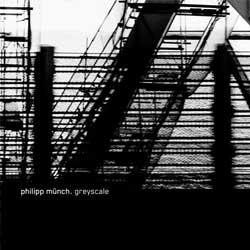Published by Alessandro Violante on May 28, 2018
 Evolution is the keyword which perfectly suits the new solo album by Philipp Münch entitled Greyscale, released on the 10th of April by Ant-Zen. That of Münch is a story which begins during early ‘90s (and presumably before), with the historic group Ars Moriendi, in which he played together with Asche, Morgenstern and Moata Omen. Then, followed his most well known project Synapscape (together with Tim Kniep) and others, less known but insteresting as well, such as The Rorschach Garden, Rasputin, Mandelbrot and so on.
Evolution is the keyword which perfectly suits the new solo album by Philipp Münch entitled Greyscale, released on the 10th of April by Ant-Zen. That of Münch is a story which begins during early ‘90s (and presumably before), with the historic group Ars Moriendi, in which he played together with Asche, Morgenstern and Moata Omen. Then, followed his most well known project Synapscape (together with Tim Kniep) and others, less known but insteresting as well, such as The Rorschach Garden, Rasputin, Mandelbrot and so on.
Although a huge part of his fans associate his name with the mixture of industrial, idm and rhythmic noise of the historical duo, the musician based in Bielefeld has a kaleidoscopic vision of electronic music, belonging to the so called “grey area”, and Greyscale offers a concise and eloquent example of this fact.
Greyscale is a very mature album, yet it sounds very fresh. It’s the result of a neverending sonic research, it represents a step forward in Münch career but, at the same time, it has a strong relation with the primordial sound of Ars Moriendi. It looks to the past to go forward.
In the twelve songs of the album the will to break the suffocating definitions of genre, and to go back to an original sonic maelstrom, emerges once gain. In Greycale there’s enclosed the whole universe of Münch, his unique style. There’s the will to experiment in other directions but in a modern way. The use of metallic percussion instruments, bass, violin, zither and harp never stand above rhyhms, vocals and synths, but enrich the songs with something more that the listener will surely catch and appreciate.
Even in the more “classic” songs such as Mantra, there’s something new. The syncopated rhythm, trademark of Synapscape, opens up toward almost EBM percussions, as well as in Behind the mirror IDM meets Münch vocals in a perfect synthesis. Also the titletrack is a very good song which looks to the last Synapscape works, in particular to Rhythm age, but in a more visionary way. We can say it sounds less clean. In general, the most convincing songs are those which look at Ars Moriendi, as the very good Moebiusband, Fangs with its heavy distortions and the dirty Tier. The ending song Keine tranen breaks the noise walls and rhythms, a minimal synth song close to The Rorschach Garden.
However, Greyscale doesn’t only offer to the listener syncopated songs, but there’s also the minimalism of “softer” episodes, in which the sound design skills of the musician emerge to the most. Nichts dringt mehr durch is a valid example, as well as Krumel.
Seen through these words, Greyscale could “only” seems a good pout-pourri, but what’s true is that is difficult, almost useless, trying to describe each shade of Münch sound, when music does it pretty well. In Greyscale there’s a huge collection of sounds, distortions, vocal effects ued by the musician and by each of his projects, there’s encloed an “alternative” story to the power of the mainstream electronic sound, which seems to be the kind most well known by listeners worldwide. A very interesting story which any electronic music passionate should know. Greyscale isn’t an easy listening album, but that’s what his fans expect from him. Something that, once again, writes the new and the unexpected. This won’t surely bother you.
Label: Ant-Zen
Rating: 9

